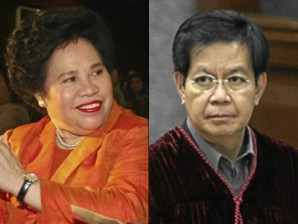Santiago scorns Lacson anti-corruption plan as silly, illegal, laughable
MANILA, Philippines—“Unconstitutional”, “egotistic”, “laughable”, “unintelligent” were how Senator Miriam Defensor-Santiago described former Senator Panfilo Lacson’s proposed anti-corruption body.
“It is amazing that the former senator can be so brazen as to propose a plan that violates existing standards of law and ethics,” Santiago said in a statement on Tuesday.
The senator was reacting to a draft executive order creating the anti-corruption body, which he had submitted to President Benigno Aquino III.
“His (Lacson) plan is laughable and ridiculous. It is unconstitutional, illegal, immoral, and egotistic,” Santiago said.
Sought to comment on Santiago’s statements, Lacson said in a text message: “Only the corrupt and the corruptible will resent the creation of an anti-corruption body.”
Santiago said she was scandalized that Lacson, a non-lawyer, himself drafted the EO when the President himself has no power to create a public office.
“Lacson’s proposal is unintelligent. It is a basic principle of the tripartite system of democracy that the creation of a public office is primarily a legislative function. He should go to Congress and lobby for this self-serving, self-aggrandizing personal pet project of his,” she said.
“Congress has not passed a law delegating to the President the legislative power to create a new office. Hence, Lacson’s plan violates not only the Constitution but also the Administrative Code and R.A. No. 6975, also known as the DILG Act of 1990,” Santiago added.
Under existing law, she said, the Philippine National Police operates under the Department of Interior and Local Government.
“There is an existing Presidential Anti-Organized Crime Task Force headed by Executive Secretary Paquito Ochoa, Jr. Lacson wants Ochoa bumped off. There is also an existing PNP under the control and supervision of the DILG secretary, who is Mar Roxas. Similarly, Lacson wants to bump off Roxas. What gall!” Santiago said.
The senator also cited a series of Supreme Court decisions that shot down Lacson’s grand plan.
The clearest Supreme Court ruling against creating a new office just to accommodate a specific person, she said, was found in the 2010 case of Biraogo v. Philippine Truth Commission, where the high court ruled that the Administrative Code prohibits the President from creating an office, under the guise of a reorganization.
The ruling referred to the Administrative Code, Section 31, and to the question of whether Congress has delegated its legislative power to create a public office to the President.
“The creation of an office is nowhere mentioned, much less envisioned in said provision. Accordingly, the answer to the question is in the negative,” Santiago said, quoting the Biraogo ruling.
She also cited the 2001 case of Buklod ng Kawaning EIIB v. Hon. Executive Secretary, where the high tribunal ruled that there was no valid delegation of power from Congress, allowing the President to create a public office.
In Buklod, she said, the high tribunal ruled that under the Administrative Code, the President is authorized to create a new office, but only as part of an executive reorganization.
“Reorganization takes place when there is an alteration of the existing structure of government offices or units therein, including the lines of control, authority and responsibility between them,” said the senator again quoting from the Buklod ruling.
In the same Buklod case, the SC held: “Clearly, the power of control is entirely different from the power to create public offices. The former is inherent in the Executive, while the latter finds basis from either a valid delegation from Congress, or his inherent duty to faithfully execute the laws.”
Santiago likewise pointed to the 2003 case of Bagaoisan v. National Tobacco Administration, where the Supreme Court ruled that even if there is a reorganization, the President is not allowed to remove civil service employees in bad faith and one of the indications of bad faith is “where an office is abolished and another performing substantially the same functions is created.”
In the 1998 case of Ople v. Torres, Santiago said the high tribunal also ruled that in the guise of issuing an administrative order, the President cannot usurp the legislative power to create offices.
She said the high cout cited the Administrative Code , defining administrative orders as “acts of the President which relate to particular aspects of governmental operation in pursuance of his duties as administrative head.”















